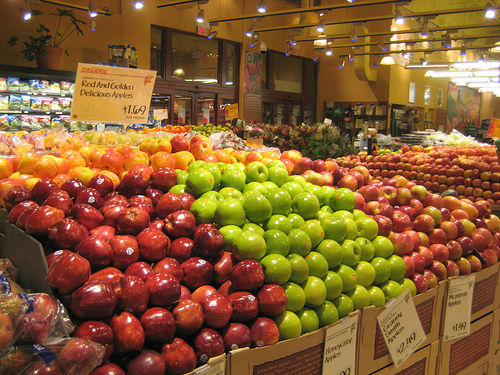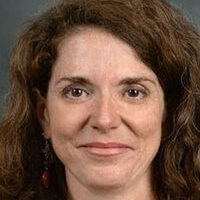
Whole Foods CEO John Mackey seems to be getting a lot of press recently. Since jumping squarely into the fight on health care reform, the “conscious capitalism” guru has lifted the veil for a wider section of the public to see how his political and economic ideology contradicts the public relations image of the $11 billion natural foods and organic grocery corporate operation he heads.
Mackey, perhaps more sophisticatedly than right-wing talk show ranters Glenn Beck or Rush Limbaugh, said the same thing they do about the Obama administration’s health care reform: that it’s socialism. In an opinion piece in the Wall Street Journal he led with a Margaret Thatcher quote: “The problem with socialism is that eventually you run out of other people’s money.” He also claimed the reform is leading to a “government take over” He advocated for, among other things, privatizing Medicare. “Enact Medicare reform. We need to face up to the actuarial fact that Medicare is heading towards bankruptcy and enact reforms that create greater patient empowerment, choice and responsibility,” he wrote.
I’ve been around long enough to know corporate-speak: “greater patient empowerment, choice and responsibility” means get more private plans in the Medicare mix so people can feel empowered by taking responsibility for choosing a private, for profit insurance plan and being “empowered” to be an unwitting conduit for public dollars to flow to a few already well-lined private pockets.
Now he’s back in the blogosphere again with The New Yorker’s revelation that he agrees with those who claim global warming has “no scientific consensus” as to its causes.
New Yorker’s Nick Paumgarten writes Mackey says “with a candor you could call bold or reckless, that it would be a pity to allow ‘hysteria about global warming’ to cause us ‘to raise taxes and increase regulation, and in turn lower our standard of living and lead to an increase in poverty.'” Paumgarten continues, “One would imagine that, on this score, many of his customers, to say nothing of most climate scientists, might disagree. He also said, ‘Historically, prosperity tends to correlate to warmer temperatures.'”
Well if prosperity tends to correlate to warmer temperatures, as Mackey asserts, sub-Saharan Africa – and the whole global South – would be rolling in riches instead of rickets, a disorder in children that causes bone softening because of lack of vitamin D, which is pervasive in developing countries.
An odd, outlook for the natural foods titan, when one of his company’s core values is “caring about our communities & our environment.”
Before I spill too much digital ink on a fellow that seems like a know-it-all teenager, self-absorbed, (expected for a teenager, but oh so unattractive for someone over 50), let me pose a few questions. Can there be “conscious capitalism,” as Mackey has argued? Can a corporation, or its CEO, through lofty values or a socially conscious mission lead to a more enlightened economic system?
I think history is littered with such utopian ideas. And one reason is there are internal laws of capitalism which circumvent any such so-called enlightened consciousness. Material forces trump wishful thinking.
Whole Foods is a good example of this. Whole Foods, under Mackey’s and his partners’ leadership, took a counter-culture movement and placed it in mainstream America, no doubt. They took ideas and movements from the 1960s and 70s – back-to-the-land, smaller-is-better, natural and organic eating – ideas and living experiences that resonated among a very small section of the population, and made it accessible to millions. (Yes, even those of us on the low-wage spectrum of the working class, who call it “Whole Paycheck,” frequent the store to buy decent food for ourselves and families.) Everyone gives Mackey and Whole Foods credit for that. Not a small thing. But still the laws of capitalism cannot be circumvented.
As Whole Foods grows, it has to “get bigger or die,” a basic law of capitalism. You know, that “too big to fail” thing with the banks. You have to get bigger or you get swallowed up by some corporation that is bigger. Monopolization, some may call it. It’s a method to maximize profit – another law. Profit isn’t good enough, it has to be maximum profit.
In an effort to get rid of competition, Whole Foods bought out many independent food co-ops. Plus it “absorbed” its competitors, like Wild Oats, Fresh Fields, Bread of Life, Nature’s Heartland, Mrs. Gooch’s Natural Foods Markets and U.K.-based Fresh & Wild. By buying out the competition, Whole Foods gained a monopoly on the organic grocery business.
So much for the idea that competition and capitalism go hand-in-hand. It’s competition to a point, until the ge- big-or-die monopolization law kicks in.
Then there is that other law. What is it? Oh yeah, the one that always tries to divide workers and keeps them from organizing. Mackey and the Whole Foods corporation are well-known for their rabid anti-unionism. Mackey’s analogy for workers organizing themselves into a union was “like having herpes. It doesn’t kill you, but it’s unpleasant and inconvenient, and it stops a lot of people from becoming your lover.” The company is well-known for making its employees sit through anti-union meetings whenever they suspect a possible organizing campaign.
Mackey embraced another notorious anti-union, low wage retailer, Wal-Mart, ranting on his CEO blog how he “loved” Wal-Mart “crushing the parasitical unions.”
He also acknowledged the power of employees organizing themselves, “Only labor unions going out on strike can radically harm a food retailer’s cash flow and Whole Foods doesn’t have any unions.”
According to The New Yorker, it was after Mackey started a business (having to meet payroll and work within hard-won labor, health and safety laws) “that his political and economic views, fed on readings of Friedman, Rand, and the Austrians, veered to the right.”
So it’s not surprising that the extreme right wing are glomming onto the Whole Foods experience for its own narrow aims. Writing in the Wall Street Journal, Hoover Institute senior fellow Michael Petrilli, advocates cultivating “Whole Foods Republicans” those “independent-minded voters who embrace a progressive lifestyle but not progressive politics.”
Perhaps they see an opening with Mackey’s most recent rants, and figure there must be a bunch of like-minded customers.
Which comes back to another law of capitalism, eventually, sometime in your life, you’ll be asked and will have to decide, “Which side are you on?”
And that’s what I call “conscious of capitalism.”
Photo: Apples on display at Whole Foods. http://www.flickr.com/photos/mindtalk/ / CC BY-NC-SA 2.0

MOST POPULAR TODAY

‘Warning! This product supports genocide’: Michigan group aims to educate consumers

Hold the communism, please: SFMOMA’s Diego Rivera exhibit downplays artist’s radical politics

After months of denial, U.S. admits to running Ukraine biolabs

“Trail of Tears Walk” commemorates Native Americans’ forced removal

Ohio: Franklin County treasurer attends Netanyahu meeting, steps up Israel Bond purchases






Comments